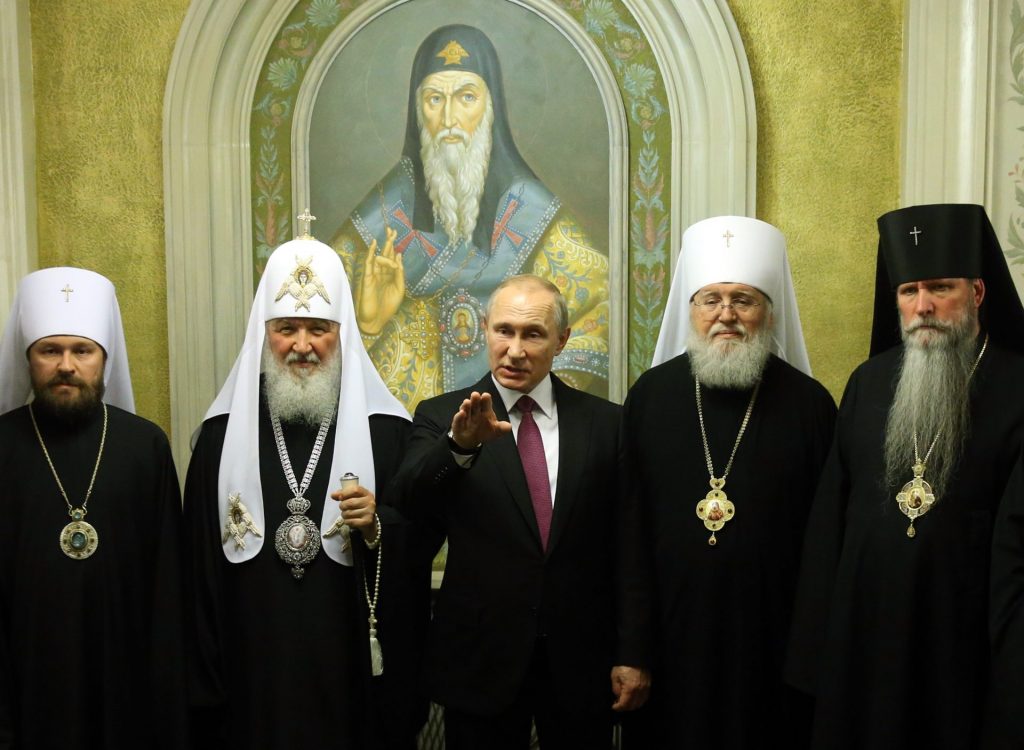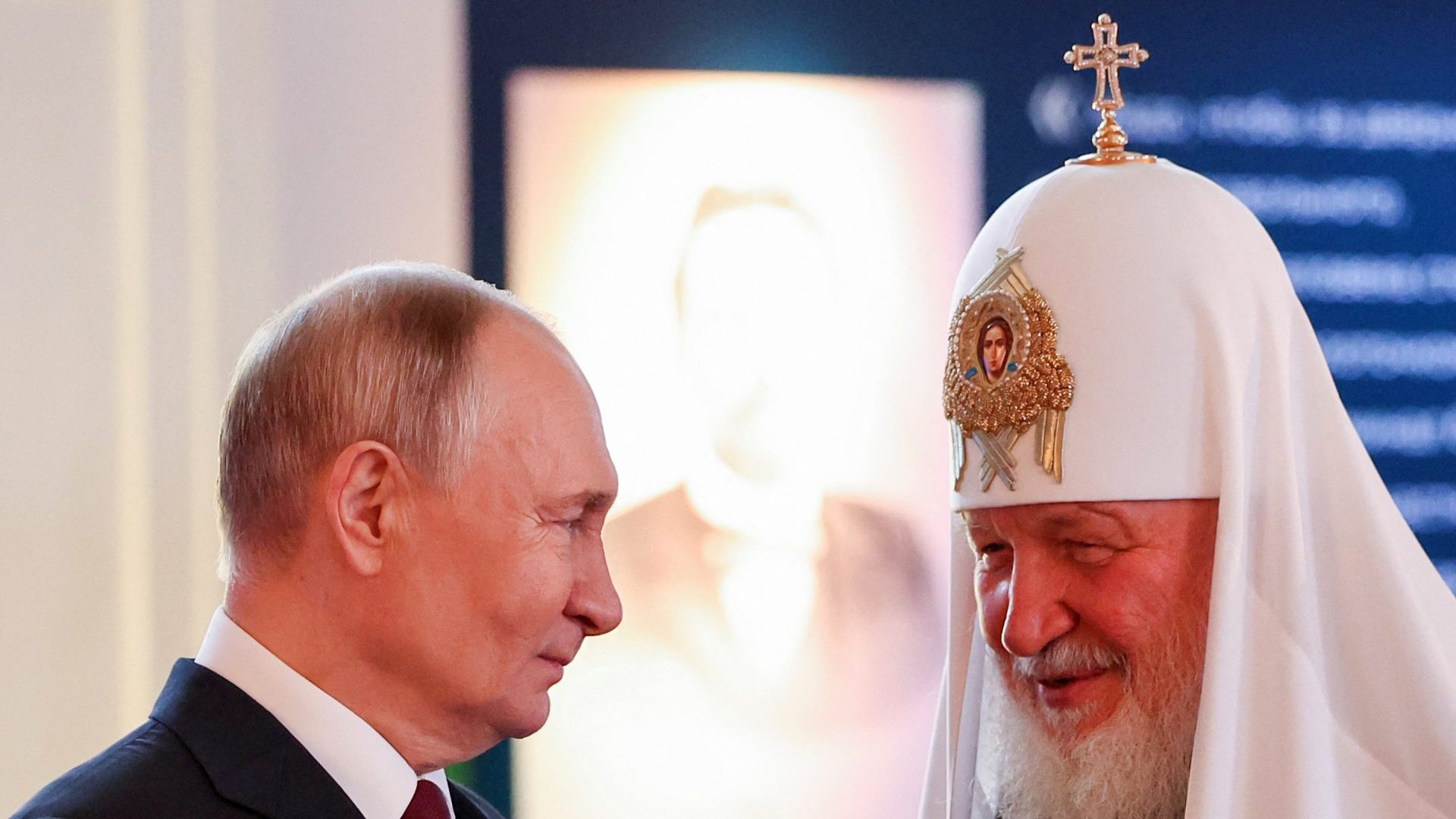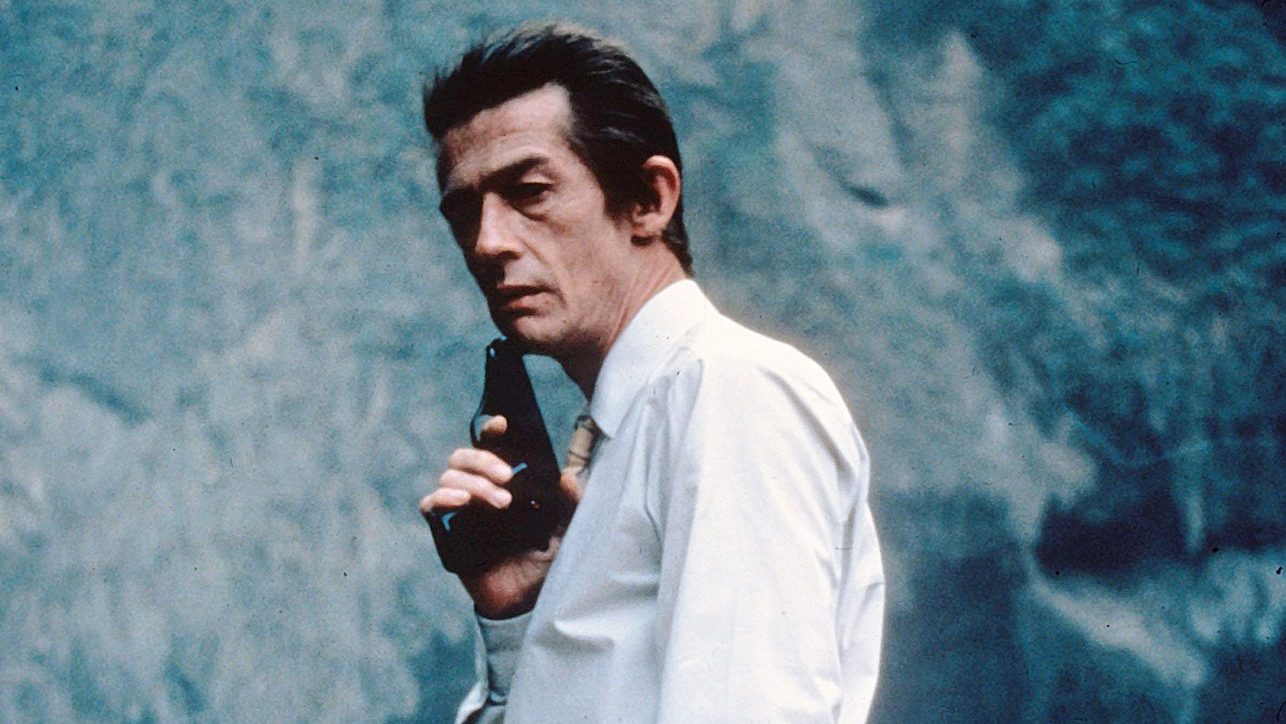Eight months into the Ukraine invasion, Russian generals faced a shortage of cannon fodder. The Kremlin responded with the first mobilisation, drafting 300,000 troops to offset heavy losses. This was the moment when Patriarch Kirill, head of the Orthodox Church, turned himself into a recruiting officer, promising eternal salvation to the young men being sent to their death.
Those who fall in battle to restore Holy Rus’ – what extremists think of as the Russian borders chosen by God – will go straight to heaven, said the prelate in a sermon west of Moscow. “They will have sacrificed themselves for others. This sacrifice washes away all the sins that a person has committed.”
Orthodoxy’s most revered figures would not have approved. St Basil the Great, one of the leading theorists of the Christian movement in the fourth century, taught that those who kill in war must repent for the blood they have shed. Instead, Kirill appeared to be preaching an Orthodox version of jihad.
The patriarch has given a spiritual imprimatur to Vladimir Putin’s dirty war. He has lamented “internecine strife” between Orthodox brothers but has never explicitly called for peace. In the first few days he said nothing. Then he said efforts should be made to minimise the bloodshed, but when it was clear that Russia wasn’t going to take Kyiv in a few days, his sermons became ever more vitriolic. His World Russian People’s Council has called Putin’s “special military operation” a Holy War, to protect the world from a west that has succumbed to Satanism.
It didn’t start that way. Kirill the warmonger has sometimes posed as a dove. In an interview for the news agency Tass, he suggested he had been demoted in the 1980s and sent to the obscure diocese of Smolensk for criticising Leonid Brezhnev’s invasion of Afghanistan.
Like Putin, he had a KGB past. His mentor was Metropolitan Nikodim, a cleric with close links to the Soviet security services, and Kirill collaborated from the start on a trip to Australia and on a posting to Geneva as envoy to the World Council of Churches.
For all that, many saw Kirill as a reformer. He raised academic standards in seminaries, preached at rock concerts and reached out to other faiths. He even had a reputation for being pro-western. In the 1990s, conservative clerics were wary of his interest in ecumenism, his regular TV appearances and his modernising zeal. Kirill – or to use his secular name, Vladimir Mikhailovich Gundyaev – has been on a journey.
Nearly a decade before he became patriarch in 2009, Kirill was involved in drawing up the church’s Social Doctrine, which decreed that the state’s authority was not absolute. It included red-button issues for Orthodox conservatives like abortion while also addressing social inequality and poverty. At his first Christmas service as head of the church, he addressed the financial crisis. “Among the bishops, he’s the only real politician,” the religious scholar, Sergei Filatov, said at the time. “If I were president, I’d be afraid of such a man.”
On occasion, Kirill seemed to take the side of ordinary Russians against the government. In March 2011, he called soaring utilities tariffs “an outrage” and urged citizens to defend their rights. He was even more outspoken in December that year amidst widespread anger at ballot rigging in parliamentary elections. When more than 100,000 people marched along Sakharov Avenue on December 24, Kirill called for “real civic dialogue”.
In these demonstrations, the biggest since the early 1990s, the anti-corruption blogger Alexei Navalny shot to prominence with his pithy description of Putin’s United Russia as “the party of crooks and thieves”. In a televised sermon on Orthodox Christmas Day, Kirill reinforced the message, saying it would be a “very bad sign” if the protesters were ignored.

But two days before a rally scheduled for February 4, Kirill made a spectacular U-turn. At a liturgy to celebrate his third anniversary as patriarch, he raised the spectre of the violent October Revolution. Orthodox believers, he said, “do not know how to join demonstrations, their voices are not heard. They pray in the silence of monastic cells and at home.”
Shortly after, Kirill told Putin that his leadership had been “a miracle from God. You once said you toil like a slave in the galleys, with the only difference that no slave showed such dedication,” he gushed. Putin replied that the separation of church and state had always been “a primitive notion”. From now on both men should devote themselves to “a totally different idea of cooperation”.
Such sycophancy prompted Pussy Riot’s performance in the Cathedral of Christ the Saviour a fortnight later, begging the Mother of God to banish Putin, and castigating his lackey, Kirill. The young women used the patriarch’s secular surname to drive home their contempt: “Patriarch Gundy believes in Putin / Better believe in God, you vermin!”
With its description of a priest in black robes with golden epaulettes, their punk prayer condemned a church infiltrated by the secret police, its misogyny and homophobia, corruption, the penetration of religion into secular schools, superstition and above all its craven attitude to power.
That spring Kirill was hit by a tide of kompromat or black PR. Earlier in his career, Russians were astonished to learn that the Moscow Patriarchate had become the country’s largest supplier of foreign cigarettes. It imported vast quantities under the guise of “humanitarian aid” and Kirill acquired a new nickname: Tabachniy Metropolit, the Tobacco Metropolitan.
Later his penchant for flashy watches made him an easy target. Photographers in Ukraine first noticed a $30,000 Breguet timepiece on the prelate’s wrist during a prayer service in St Volodymyr’s Cathedral in 2009. On that same trip, he warned against western capitalism and “unbridled consumption”.
The watch was forgotten until 2012, when a picture emerged of Kirill wearing it in a meeting with Russia’s justice minister. The church’s press department made matters worse by using Photoshop to remove it but forgetting to erase its reflection on a shiny table. People joked that the disappearing watch was truly a miracle.
At first Kirill denied wearing it; then he claimed it was a gift from a wealthy parishioner. The affair seemed a spectacular case of media mismanagement. But some believed it was stage-managed by the security services to bring the patriarch to heel.
Other allegations followed, including a story that newspapers dubbed “the dust scandal”. It involved a court case against a neighbour carrying out building works in an apartment block opposite the Kremlin. The apartment belonged to Kirill, but legal proceedings were launched by its occupant, a woman called Lidia Leonova. Journalists were told she was the patriarch’s second cousin and that any questions about his private life were “unethical”.
The Patriarchate complained of an information war against the prelate and his church. Some believe Kirill was punished for initially siding with people protesting about rigged elections. Others said it was his handling of Pussy Riot’s punk prayer that led to the negative publicity.
One of the church’s most charismatic figures, Deacon Andrei Kuraev, campaigned for Kirill to become patriarch but later became one of his fiercest critics. He said Kirill’s “strange hysterical reaction” to the women and obsession with locking them up was used by the Kremlin to drive a wedge between the patriarch and the people.
Many who initially criticised Pussy Riot were shocked that two of the band members, mothers of young children, were given two-year prison sentences for their 40-second performance. “He lost credibility in the eyes of many believers and that made him hostage to state power,” Kuraev told me.
In the wake of the Pussy Riot affair, the government passed legislation against insulting the religious feelings of believers, now used to crack down on any form of dissent. Scores of people have been charged or convicted under the law, including a man from Stavropol, in southern Russia, whose home was raided by armed police after he wrote “There is no God” in an online chat.
Lev Lur’e, a St Petersburg historian, argues that the church has replaced the Communist Party as a way of forcing obedience to an authoritarian regime. Its reaction to Pussy Riot suited Putin as he prepared for his third term as president. Those who demonstrated against him and sympathised with the punks were, conveniently, also critical of Orthodoxy.
“He says his political enemies are against the traditional values of Holy Russia,” said Lur’e. “And those on the side of these female hooligans – they are just godless traitors.” From her prison cell, Masha Alyokhina, a member of Pussy Riot and an Orthodox believer, wrote: “I thought the church loves all its children, but it seems it only loves those who vote for Putin.”
Never again would Kirill do or say anything which contradicted the authorities. Tracing the career of Russia’s 16th patriarch, the film-maker Sergei Erzhenkov notes that like Putin, Kirill came to power as a moderniser but will be remembered as an arch reactionary. In Soviet times, taking the lead from his spiritual father Nikodim, Kirill swore allegiance to atheists in the KGB and they swiftly promoted him. In the 1990s he welcomed money changers to the temple, and in the 2000s he turned the Church into an ideological department of the state.
Looking back, Kuraev agrees that 2012 not only marked a watershed in church-state relations but set the country on the path of war. In October, he told the BBC: “With Pussy Riot, Patriarch Kirill made an unmistakable choice: he canonised hatred”.
The patriarch portrays his close relations with the Kremlin as a 21st-century version of the ancient Byzantine doctrine of symphonia, in which church and state work together for the good of the nation. Apart from the military and the FSB, no other organisation has enjoyed such prominence and protection in post-Soviet Russia.
But Kirill has earned that power by debasing his church and its liturgy. Once he became an active combatant in the war, he threw in his lot with Putin. They have stood together and will fall together.
Lucy Ash is author of The Baton & The Cross, published by Icon Books




